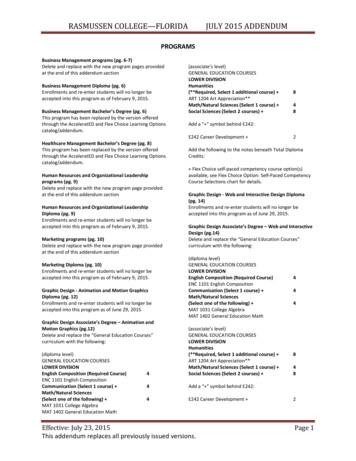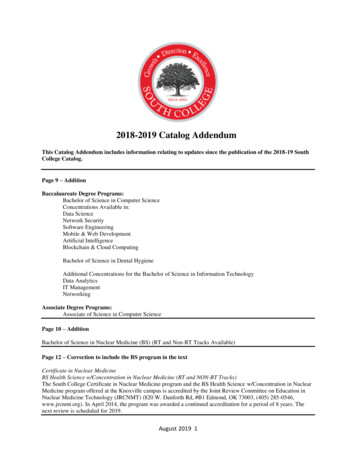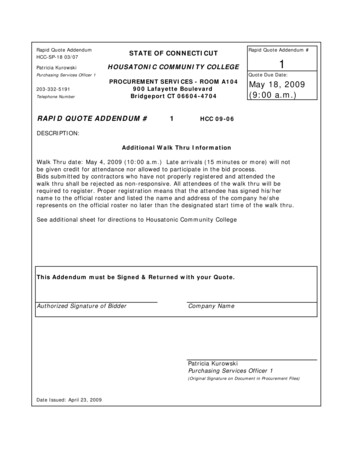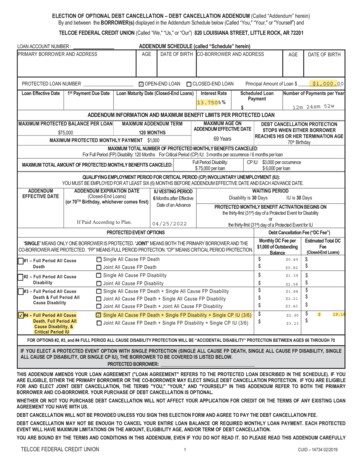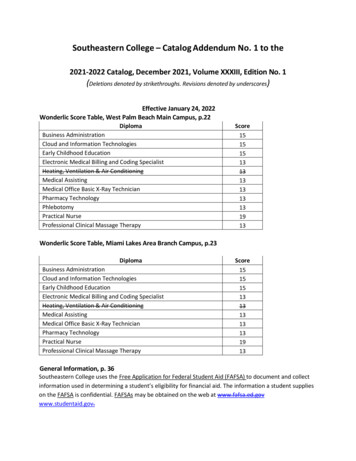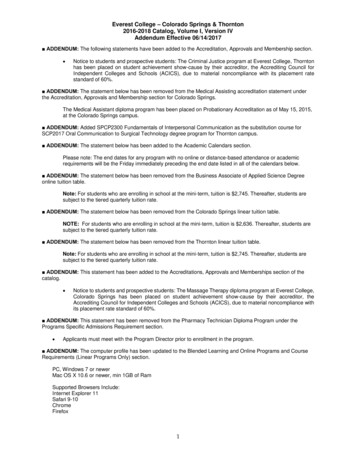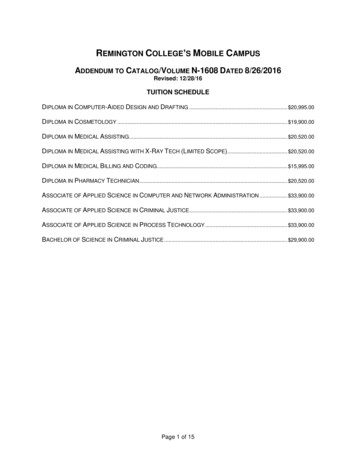
Transcription
REMINGTON COLLEGE’S MOBILE CAMPUSADDENDUM TO CATALOG/VOLUME N-1608 DATED 8/26/2016Revised: 12/28/16TUITION SCHEDULEDIPLOMA IN COMPUTER-AIDED DESIGN AND DRAFTING . 20,995.00DIPLOMA IN COSMETOLOGY . 19,900.00DIPLOMA IN MEDICAL ASSISTING . 20,520.00DIPLOMA IN MEDICAL ASSISTING WITH X-RAY TECH (LIMITED SCOPE). 20,520.00DIPLOMA IN MEDICAL BILLING AND CODING. 15,995.00DIPLOMA IN PHARMACY TECHNICIAN . 20,520.00ASSOCIATE OF APPLIED SCIENCE IN COMPUTER AND NETWORK ADMINISTRATION . 33,900.00ASSOCIATE OF APPLIED SCIENCE IN CRIMINAL JUSTICE. 33,900.00ASSOCIATE OF APPLIED SCIENCE IN PROCESS TECHNOLOGY . 33,900.00BACHELOR OF SCIENCE IN CRIMINAL JUSTICE . 29,900.00Page 1 of 15
ADMINISTRATORS AND FACULTYADMINISTRATORS . TITLESMichael Seltzer . Campus President andDirector of EducationJenny Widener. Director of AdmissionsLaura Pinion . Director of Career ServicesScott King . Area Director of Student FinanceRachel Kellett . Student Services AssociateJody Hollinger . Cosmetology ChairpersonChristopher Rigoni . Criminal Justice ChairpersonHope Newsome . Medical Assistant/MedicalAssistant with X-Ray ChairpersonTeKia Rocker . Medical Billing and Coding andPharmacy Tech Program DirectorAllaway “Frank” Huckabee . Process Technology ChairpersonNatasha Bunn . Externship CoordinatorDonald Schermerhorn. RegistrarCOMPUTER-AIDED DESIGN AND DRAFTINGFACULTY . CREDENTIALS . INSTITUTIONSDaniel Lubecki . Diploma, CADD .Remington CollegeAAS, Process Technology .Remington CollegeDavid Balles . AAS, Engineering Technology .State University of New YorkGene Guined . BS, Industrial Design .Auburn UniversityRhett Cropper . Associate of Science in Engineering .Faulkner State Community CollegeSusan Meredith . BA, Fine Arts .University of Southwest LouisianaCOSMETOLOGYFACULTY . CREDENTIALS . INSTITUTIONSDenise Small . Licensed Cosmetology Instructor .State of AlabamaLicensed Cosmetologist.State of AlabamaJody Hollinger . Licensed Cosmetology Instructor .State of AlabamaMonique Boykin . Licensed Cosmetology Instructor .State of AlabamaLicensed Cosmetologist.State of AlabamaRosa Dotch. Licensed Cosmetology Instructor .State of AlabamaLicensed Cosmetologist.State of AlabamaMEDICAL ASSISTING AND MEDICAL ASSISTING WITH X-RAY TECH (LIMITED SCOPE)FACULTY . CREDENTIALS . INSTITUTIONSChristy Stanberry . BS, Biomedical Science. University of South AlabamaDiana Kennedy . RN . State of AlabamaBS, Nursing . University of MobileErica Bradley . MS, Nursing . University of MobileBS, Nursing . University of MobileFelicia Tansey . AS, Medical Assistant . Virginia CollegeHope Newsome . BS, Radiologic Sciences. Midwestern State UniversityKaren Sutton . Associate Degree in Nursing . Bishop State Community CollegeRN . State of AlabamaKathryn Overton . AS, Nursing . Bishop State Community CollegeTracey Gatchell . AAS, Medical Office Management . Commonwealth CollegeCertificate, Radiology . DePaul School of Radiographic TechnologyLaShuned Williams . RN . University of South AlabamaShontal Taite . BS, General Studies . University of MobileAS, Nursing . Pensacola State CollegeLPN . Pensacola State CollegeMEDICAL BILLING AND CODINGFACULTY . CREDENTIALS . INSTITUTIONSCharyce Birch . Nine years of professional coding experiencePhebie Abrams . Diploma, Medical Assisting . Capps CollegePage 2 of 15
PHARMACY TECHNICIANFACULTY . CREDENTIALS . INSTITUTIONSBarry J. Coleman . BSN.University of South AlabamaDiploma, Pharmacy Technician .Remington CollegePatricia McLendon . BS, Interdisc. Stud./Environ. Bus & Nurs .University of South AlabamaAS, Medical Lab Technology .Mississippi Gulf Coast Community CollegeTekia Rocker . BS, Biology.University of MobileAS, Pre-Pharmacy .Faulkner StateRegistered Pharmacy Technician .State of AlabamaCertified Pharmacy Technician .PTCBTyisha Tyus . AS, General Education .Bishop State Community CollegeCOMPUTER AND NETWORK ADMINISTRATIONFACULTY . CREDENTIALS . INSTITUTIONSCharles "Chad" Fesler . BS, Computer Science .University of South AlabamaCertified Technology Specialist, MCP .MicrosoftCynthia Patrick . BA, Business Administration .Georgia Southern CollegeMichelle Barlow . MA, Business Administration .University of MobileBS, Computer Information Sciences .University of South AlabamaScott Amsbaugh . BIS .University of South FloridaCRIMINAL JUSTICEFACULTY . CREDENTIALS . INSTITUTIONSChristopher Rigoni . BS . Auburn UniversityPROCESS TECHNOLOGYFACULTY . CREDENTIALS . INSTITUTIONSAllaway Frank Huckabee . BAS, Operations Management Tech . Southeast College of TechnologyAA, Work Center Management . Community College of the Air ForceMCP, Technology Specialist, 070-067, 070-271, 070-620Anthony Pringle . BS, Industrial Management . University of South AlabamaCarly Davis . BS, Physics . University of South AlabamaLarry Palmer . MBA . Springhill CollegeBS, Chemistry . University of South AlabamaMichael Gelsie . MS, Electrical Engineering . Ohio State UniversityBS, Electrical Engineering . Pennsylvania State UniversityRichard Michael . BS, Education. University of South AlabamaShane Raiford. MS, Occupational Safety & Health . Columbia Southern UniversityBS, Environmental Management . Columbia Southern UniversityGENERAL EDUCATIONFACULTY . CREDENTIALS . INSTITUTIONSAndrea Coleman. ME, Early Childhood Education .University of South AlabamaBS, Elementary Education .University of MobileAS, Accounting .Bishop StateAA, General Education .Bishop StateDaviette Bush . MS, Curriculum & Instruction .George Mason UniversityBS, Early Childhood Education .University of South AlabamaMia McGee . MS, Management .Faulkner UniversityBS, Management of Human Resources .Faulkner UniversityAS, Liberal Arts .Faulkner UniversityMitzy Tyson . MS, Management .Fontbonne UniversityBS, Speech Communication .Southern Illinois UniversitySherria Brown . MBA, General Business.Baker CollegeBA, Business Management .Dillard UniversityPage 3 of 15
ADDITIONAL MODIFICATIONSPage 1:The following statement has been added to the ACCSC Accreditation subsection of the Accreditation,Affiliations and Licensing section:Remington College’s GED Test Preparation Course is not within the Campus’ scope of accredited programs.Page 3:The first paragraph in Item 2 of the Admissions Requirements and Procedures has been revised to read asfollows:Provide documentation of high school graduation or equivalent (such as a GED) prior to enrollment (i.e.,before the Enrollment Agreement is signed by the accepting school official and before being allowed to startclasses).Page 3:The second sentence in Item 3 of the Admissions Requirements and Procedures has been revised toread as follows:The Wonderlic Scholastic Level Exam (SLE) exam will be used as the sole acceptable entrance exam for allapplicants other than those seeking admission under the Ability-to-Benefit determination, who will be subjectto the exam procedures described in item 4 below.Page 3:The required passing score for the Wonderlic exam will be 13 or higher for the Process Technologyassociate degree program.Page 3:Items 4 and 5 of the Admissions Requirements and Procedures have been renumbered 6 and 7.Page 3:The following section has been added to the Admissions Requirements and Procedures as Item 4.For the Medical Assisting diploma program, an applicant may be admitted under an Ability-to-Benefitdetermination that allows admission without requiring the applicant to have a high school diploma orequivalent, provided that the applicant is at least 18 years of age, has met the criteria to establish that he orshe has the ability to benefit from the program and is also concurrently enrolled in Remington College’s GEDTest Preparation Course.To be admitted as an Ability-to-Benefit student, an applicant must achieve a passing score established byRemington College on a test approved by the United States Department of Education. Remington Collegeuses the Wonderlic Basic Skills Test, Quantitative Form QS-1 or QS-2, and Verbal Form VS-1 or VS-2. Aminimum score of 210 must be obtained on the quantitative test and a minimum score of 200 must beobtained on the verbal test. Applicants will be allowed to take the entrance examination a maximum of twotimes. If an applicant must take the entrance exam a second time it must be administered during asubsequent informational session following the informational session in which the first exam was taken.One of the requirements to remain enrolled in the Medical Assisting diploma program is to beconcurrently enrolled in Remington College’s GED Test Preparation Course until you successfullypass the GED test. Otherwise, failure to remain concurrently enrolled in Remington College’s GEDTest Preparation Course will result in the termination of your enrollment with Remington Collegemeaning you will be dropped from both the GED Test Preparation Course AND the Medical Assistingdiploma program.Students who do not maintain satisfactory attendance in the GED Test Preparation Course will be droppedfrom both the GED Test Preparation Course AND the Medical Assisting Diploma Program. Additionally,students will be required to sit for the GED test (at no charge) no later than the end of the eighth module ofthe Program. Failure to take the GED test before the end of the eighth module will result in the student beingdropped from both the GED Test Preparation Course AND the Medical Assisting diploma program.Page 3:The following section has been added to the Admissions Requirements and Procedures as Item 5.For admission into the Criminal Justice bachelor degree program, applicants must have an associate’sdegree in Criminal Justice or a related field as determined by the Chief Academic Officer (or his/herdesignee) for Remington College with a minimum of 90 quarter credit hours in lower-level coursework, ofwhich a minimum of 24 credit hours must be in general education in fields such as math, English, socialsciences, and communications, or the equivalent from a nationally or regionally accredited institution.Applicants who have the required number of credit hours but have not completed all the prerequisite courseswill be required to enroll into the associate’s degree program and successfully complete the neededprerequisite courses before they will be eligible to enroll in any bachelor’s degree program.Page 4 of 15
Page 4:The first paragraph of the Attendance Requirements for Activation has been revised to read as follows:For Programs Other than the Cosmetology Program For applicants enrolled in courses delivered residentially:oAttend at least one class on at least 50% of the days classes are scheduled in theactivation period, andoAttend at least one class on at least 50% of the days classes are scheduled in the secondweek of the term. For applicants enrolled in only courses delivered via distance education (on-line), attend at leastonce during the first two weeks of the term.Applicants enrolled in courses delivered both residentially and via distance education (on-line) will berequired to meet the activation requirements for applicants enrolled in courses delivered residentially.However, please note that failure to attend any scheduled distance education (on-line) courses during thefirst two weeks may result in the applicant being dropped from those courses. Please see the ProceduresDrop/Add Period and Adding or Dropping Courses policies for additional information.For the Cosmetology ProgramAttend at least 50 clock hours during the first two weeks of the term.Page 17:Students who wish to access the LMS off campus will need to do so with a computer that is compatible withthe LMS system. Below are the current requirements and recommendations.Computer Requirements: Computer less than 5 years old preferred for optimal use Valid email address Color monitor Sound card with speakers or headphones 4 GB of RAM 1 GB of free disk space Broadband Internet connection (DSL or cable recommended) Web browser (Chrome is highly recommended) Cookies must be enabled JavaScript must be enabled Pop-up blocker is turned offSoftware Recommendations: Chrome Adobe Acrobat Reader Adobe Flash Word Processing Software will be needed to view some course documents. Microsoft Office ispreferred. OpenOffice is acceptable. OpenOffice is free software available athttp://www.openoffice.org. Google Docs is also acceptable.Browser Recommendations:BrowserMinimum version requiredRecommended versionGoogle Chrome30.0LatestMozilla Firefox25.0Latest6LatestApple SafariPage 37:Courses MI115, MI125, MI135, and MI145 no longer include keyboarding application.Page 5 of 15
Page 51:The following attendance policy has been added to the catalog.ATTENDANCE POLICY FOR THE GED TEST PREPARATION COURSEThe GED Test Preparation Course consists of 16 hours of instruction per each four-week module and isdelivered in one-hour sessions four days per week.Students must attend at least 75% of the scheduled GED Test Preparation Course sessions each module. Astudent who does not attend at least 75% for two (2) consecutive modules will be dropped from the GEDTest Preparation Course AND the Medical Assisting diploma program.Page 61:The following complaint policy has been added:Complaint Policy for Students Receiving VA Education BenefitsAny complaint against the school should be routed through the VA GI Bill Feedback System by going to thefollowing link: http://www.benefits.va.gov/GIBILL/Feedback.asp. The VA will then follow up through theappropriate channels to investigate the complaint and resolve it satisfactorily.Page 66:The following changes have been made to the list of Directors of Officers for Remington College.Jack W. Forrest, Director was removedDr. Rosalie Lampone, Campus President/Little Rock was removedPage 6 of 15
CRIMINAL JUSTICEBACHELOR OF SCIENCE18 Months(Completion Program)The Criminal Justice Bachelor’s Degree Program provides training in forensic psychology, criminal justice management,vice and narcotics, investigative methods, security management, criminal justice ethics, and the application of computersto preventing crime.The objective of this Program is to prepare graduates for entry-level positions, such as corrections, loss prevention, andsecurity.This Program requires completion of a minimum of 180 credit hours, including any transfer credits that have beenaccepted. Program completion normally requires 18 months for full-time students (assuming the student has met theprerequisite for admission). For admission, applicants must have an associate’s degree. See Admissions Requirementsand Procedures for the specifics prerequisite for admission to this Program.The Criminal Justice Degree Program is delivered in a system of six three-month quarters.Upon successful completion of all areas of this Program, graduates will be awarded a Bachelor of Science Degree inCriminal Justice.CourseNumberQuarterCreditHoursCourse NameBachelor or Upper-Level Core CurriculumCJ3611Juvenile Law and JusticeCJ3613Contemporary CorrectionsCJ3621Selected Topics in Law EnforcementCJ3623Safety and Risk ManagementCJ3631Comparative Criminal Justice SystemsCJ3633Criminal Justice Research Methods and Data ResourcesCJ4641Forensic PsychologyCJ4643Criminal Justice ManagementCJ4651Selected Topics in InvestigationsCJ4653Criminal Justice Information SystemsCJ4661Restorative JusticeCJ4663Vice, Narcotics and Crime 005.005.00Subtotal:Bachelor or Upper-Level General EducationGE3627Political ScienceGE3807Abnormal PsychologyGE4526Contemporary U.S. HistoryGE4616Advanced CompositionGE4631Ethics606.006.006.006.006.00Page 7 of 15Subtotal:30Total:90
CJ36115.00 Quarter Credit HoursJuvenile Law and JusticeThis course explores some of the most important current controversies in juvenile justice. Coursework includes a review of themajor theories of juvenile delinquency and explores psychological and biological factors that may explain delinquent behavior. Thecourse also explores the links between substance abuse and delinquency.Prerequisite(s): NoneCJ36135.00 Quarter Credit HoursContemporary CorrectionsThis course offers a survey of contemporary issues involving the administration of justice. Coursework includes the examination ofcurrent developments, controversies, and management issues as they pertain to correctional administration. Additional analysisand discussion centers on the use of prisons as the principal means of punishing criminal offenders and controlling criminalbehavior.Prerequisite(s): NoneCJ36215.00 Quarter Credit HoursSelected Topics in Law EnforcementThis course presents topics important to law enforcement and corrections. Discussion includes concepts and applications thatpertain to managing hostage situations and critical incidents in both law enforcement and corrections, as well as the evolution andcultural response to the social issue of domestic violence with a focus on the “cycle of violence.” Additional topics include howtechnology and advances in technology are instrumental to criminal justice agencies, and common misconceptions regarding theportrayal of law enforcement and corrections with respect to today’s media coverage.CJ36235.00 Quarter Credit HoursSafety and Risk ManagementThis course explores the roles, techniques, and strategies of safety and risk management in both the private and public sectors.Coursework includes an examination of the concepts, techniques, and strategies of asset protection, crime prevention, and lossreduction, with an emphasis on the selection and implementation of comprehensive prevention systems and loss-reductionstrategies. Topics also include facility security, OSHA regulations, and topologies of fraud.Prerequisite(s): NoneCJ36315.00 Quarter Credit HoursComparative Criminal Justice SystemsThis course is designed to provide students with a survey of worldwide criminal justice philosophies and practices, along withcontemporary studies of criminal justice organizations and legal systems in major western and emerging nations.Prerequisite(s): NoneCJ36335.00 Quarter Credit HoursCriminal Justice Research Methods and Data ResourcesThis course addresses the function of criminology-based research as well as the crime analysis function in law enforcementoperations. Instruction is designed to develop analytical reporting skills and uses computer applications, metadata, statisticalanalysis, and field research techniques.Prerequisite(s): NoneCJ46415.00 Quarter Credit HoursForensic PsychologyThis course uses a case-study approach to investigate the field of forensic psychology. Coursework includes an examination ofhow forensic science is applied in the areas of serial crime and violent offenses, as well as the arena of courtroom defense andprosecution aspects of insanity pleas.Prerequisite(s): NoneCJ46435.00 Quarter Credit HoursCriminal Justice ManagementThis course is designed to introduce students to administrative and management principles and practices applicable to criminaljustice agencies, including law enforcement, the court system, and corrections. Topics focus on organizational structure anddevelopment, operations, technology trends, and management theories.Prerequisite(s): NoneCJ46515.00 Quarter Credit HoursSelected Topics in InvestigationsThis course explores contemporary criminal justice issues that require expertise in specialized investigative methods. Computerrelated criminal investigations such as child pornography, fraud, and identification theft are covered, with a focus on how theinternet can be used as an investigative tool. A historical perspective of criminal terrorism as well as special investigativetechniques associated with the investigation of terrorist activity are presented. Additional analysis and discussion centers onforensic advances as they relate to suspect identification and crime scene analysis.Prerequisite(s): NonePage 8 of 15
CJ46535.00 Quarter Credit HoursCriminal Justice Information SystemsThis course is an introduction to the field of computer information crime, basic criminal techniques, and relevant laws. Courseworkincludes components of computer forensics, detecting and interceding in computer crimes, techniques used by hackers, andtechniques to detect and prevent hackers from attacking and infiltrating computer systems. Coursework also includes a discussionof communication techniques used by computer criminals, with an overview of encryption, stenography, and hacker slang. Topicspresented include computer stalking, harassment and child protection methods and litigation, depositions, expert reports, and howto select an appropriate expert witness.Prerequisite(s): NoneCJ46615.00 Quarter Credit HoursRestorative JusticeThis course is designed to provide students with a fundamental understanding of the concepts and principles of restorative andcommunity justice. Offender accountability, victim participation in various stages of criminal proceedings, community involvement,and restoration are emphasized.Prerequisite(s): NoneCJ46635.00 Quarter Credit HoursVice, Narcotics, and Crime IntelligenceThis course is designed to provide an interactive opportunity for students to develop enforcement strategies for investigating vice,narcotics, and organized crime cases. The course focuses on the history and development of traditional and non-traditionalorganized crime, illegal narcotics trade and trafficking, the abuse and effects of illegal drugs, and enforcement methods. Theoperational strategies of law enforcement in combating crime, including electronic surveillance, intelligence operations, and covertoperations, is discussed and applied in various role-play scenarios.Prerequisite(s): NoneGE36276.00 Quarter Credit HoursPolitical ScienceThis course introduces the various fields of political science and provides an understanding of political life in a systematic andcomparative way. The course presents in-depth studies of significant concepts in political science, such as ideology, politicalbehavior, governmental institutions, democracy, and political development. The course also offers a comparative study of politicalsystems of different nations and an overview of some of the major issues in international relations.Prerequisite(s): a lower-level course in Human Relations or equivalent Social Science courseGE38076.00 Quarter Credit HoursAbnormal PsychologyThis course explores the history, symptoms, diagnostic categories, etiology, legal issues, multicultural contexts, and treatment ofabnormal behavior.Prerequisite(s): NoneGE45266.00 Quarter Credit HoursContemporary U.S. HistoryThis course covers the major events and trends of the post-World War II era, the onset of the Cold War, and the domestic andforeign policies of presidential administrations beginning with Truman. Some major problems, such as urban decay and civil rightsfor minorities, are considered in the context of the period. Also covered are the onset and results of the information and technologyrevolution.Prerequisite(s): NoneGE46166.00 Quarter Credit HoursAdvanced CompositionThis course is designed to train students to focus on critical reading and thinking as well as analytical and argumentative writing.Coursework includes selected readings and weekly writing assignments and is designed to encourage students to present ideas inan organized manner that is grammatically correct and uses recognized documentation formats.Prerequisite(s): English Compos
page 1 of 15 remington college's mobile campus addendum to catalog/volume n-1608 dated 8/26/2016 revised: 12/28/16 tuition schedule diploma in computer-aided design and d diploma in c diploma in medical a diploma in medical assisting with x-ray tech (limited scope) diploma in medical billing and c diploma in pharmacy t associate of applied science in c

